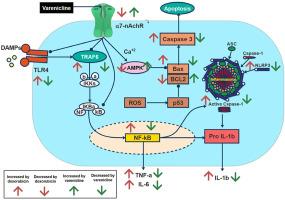Varenicline作为抗阿霉素毒性的心脏保护剂:大鼠模型中凋亡、TLR4/NF-κB和炎性体/caspase-1/IL-1β通路调节的研究
IF 4.7
3区 医学
Q1 PHARMACOLOGY & PHARMACY
引用次数: 0
摘要
阿霉素引起的心脏毒性是肿瘤学的一个重大挑战,影响治疗效果和患者的生活质量。对保持抗癌功效的心脏保护剂的研究仍在进行中。伐尼克兰是一种常用的治疗烟瘾的处方药,在调节炎症反应方面显示出良好的效果,表明它对阿霉素引起的心脏损伤具有潜在的保护作用。本研究探讨了伐尼克兰对阿霉素诱导的心脏毒性的心脏保护作用,重点关注炎症和凋亡信号通路。本研究将大鼠分为5个实验组:对照组(生理盐水)、单伐尼克林组(100 μg/kg/天)、单阿霉素组(每48小时2.5 mg/kg,共8次)和两个联合组,分别给予高剂量(100 μg/kg/天)和低剂量(50 μg/kg/天)的阿霉素,疗程为18天。心电图分析表明,阿霉素治疗引起明显的心功能紊乱,包括st段抬高和QT间期延长,以及cTnT和CK-MB水平升高,表明心脏损伤。阿霉素治疗还显著增加促炎和凋亡标志物如TLR4、Bax、TNF-α、NF-κB、TRAF-6、IL-1β和IL-6,激活炎性小体成分如NLRP3,提高Bax/Bcl-2比值和caspase-3活性,降低α7-nAchR的表达。相反,伐尼克兰联合治疗可改善心电图参数,降低TLR4和NF-κB水平,减弱促凋亡标志物,增加α7-nAchR表达,显示其作为减轻阿霉素引起的心脏毒性的治疗药物的潜力。总之,伐尼克兰通过调节炎症和凋亡通路,改善心功能和电稳定性显示出保护作用。因此,我们认为伐尼克兰可能是一种潜在的治疗药物,以减轻阿霉素引起的心脏毒性。本文章由计算机程序翻译,如有差异,请以英文原文为准。

Varenicline as a cardioprotective agent against doxorubicin-induced toxicity: A study on apoptotic, TLR4/NF-κB, and inflammasome/caspase-1/IL-1β pathway modulation in a rat model
Doxorubicin-induced cardiotoxicity represents a significant challenge in oncology, impacting treatment efficacy and patient quality of life. The search for cardioprotective agents that preserve anticancer efficacy remains ongoing. Varenicline, a prescription medication commonly used to treat smoking addiction, showed promising outcomes in modulating inflammatory responses, indicating a potential protective role against doxorubicin-induced cardiac injury. This study investigates varenicline's cardioprotective effects on doxorubicin-induced cardiotoxicity, focusing on inflammatory and apoptotic signaling pathways.
In this study, rats were divided into five experimental groups: control (Saline), a varenicline-only group (100 μg/kg/day), a doxorubicin-only group (2.5 mg/kg every 48 h for eight doses), and two combination groups receiving doxorubicin with either a high (100 μg/kg/day) or low (50 μg/kg/day) dose of varenicline, over 18 days.
ECG analysis indicated that doxorubicin treatment caused significant disruptions, including ST-segment elevation and prolonged QT intervals, along with elevated levels of cTnT and CK-MB, signifying cardiac injury. Doxorubicin treatment also significantly increased pro-inflammatory and apoptotic markers such as TLR4, Bax, TNF-α, NF-κB, TRAF-6, IL-1β, and IL-6, while activating inflammasome components like NLRP3 and elevating the Bax/Bcl-2 ratio and caspase-3 activity along with decreasing the expression of α7-nAchR. In contrast, varenicline co-treatment improved ECG parameters, reduced TLR4 and NF-κB levels, attenuated pro-apoptotic markers, and increased α7-nAchR expression, highlighting its potential as a therapeutic agent for mitigating doxorubicin-induced cardiotoxicity.
In conclusion, varenicline demonstrates protective effects by modulating inflammatory and apoptotic pathways, improving cardiac function and electrical stability. Therefore, we suggest that varenicline may be a potential therapeutic agent for mitigating doxorubicin-induced cardiotoxicity.
求助全文
通过发布文献求助,成功后即可免费获取论文全文。
去求助
来源期刊
CiteScore
9.00
自引率
0.00%
发文量
572
审稿时长
34 days
期刊介绍:
The European Journal of Pharmacology publishes research papers covering all aspects of experimental pharmacology with focus on the mechanism of action of structurally identified compounds affecting biological systems.
The scope includes:
Behavioural pharmacology
Neuropharmacology and analgesia
Cardiovascular pharmacology
Pulmonary, gastrointestinal and urogenital pharmacology
Endocrine pharmacology
Immunopharmacology and inflammation
Molecular and cellular pharmacology
Regenerative pharmacology
Biologicals and biotherapeutics
Translational pharmacology
Nutriceutical pharmacology.

 求助内容:
求助内容: 应助结果提醒方式:
应助结果提醒方式:


